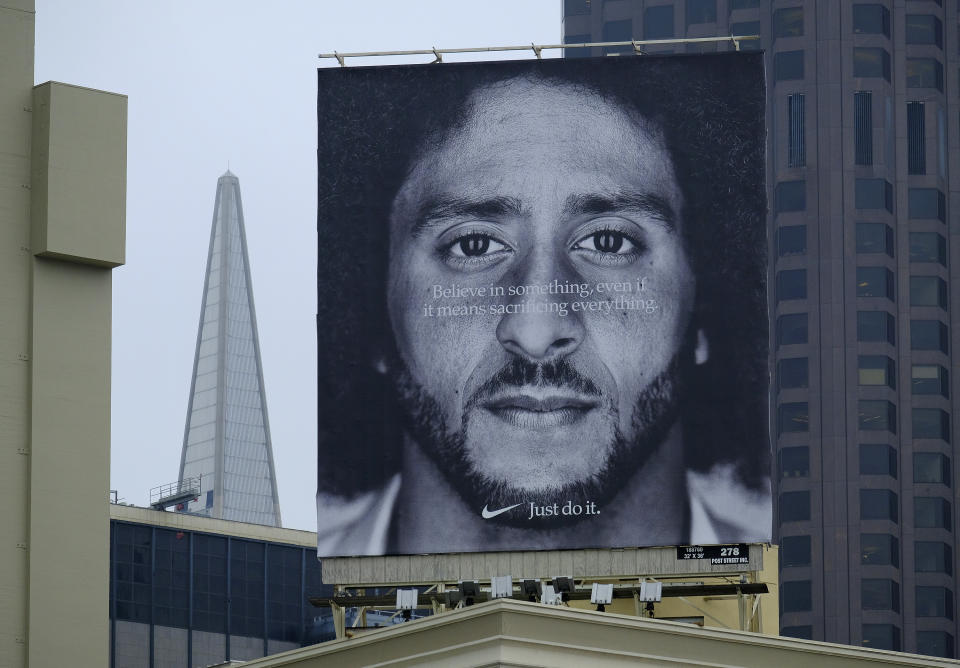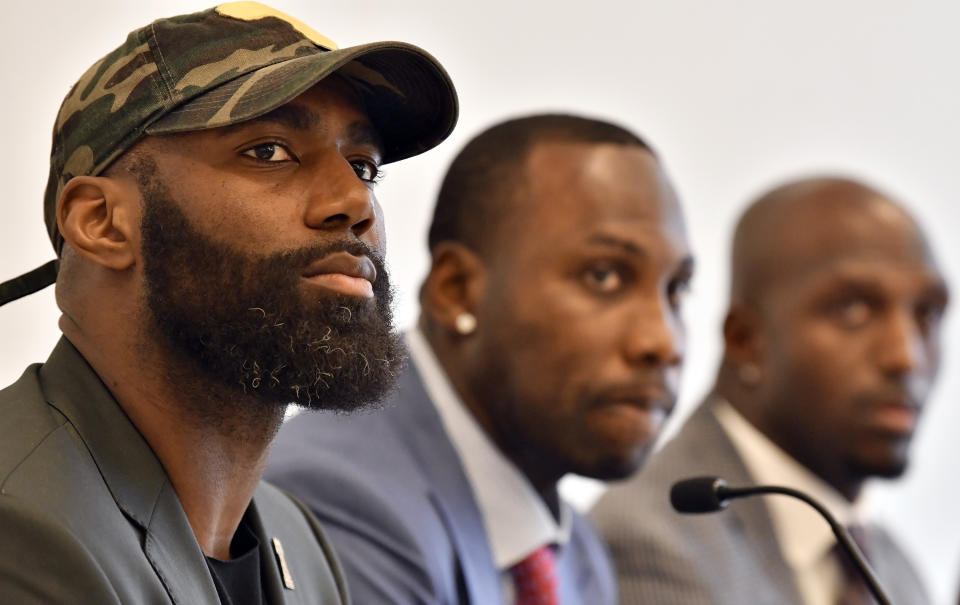Will Colin Kaepernick’s Nike campaign overshadow roots of his protest?
We are talking a lot about Nike. We aren’t talking much about police brutality.
Nike’s decision to include Colin Kaepernick as part of its most recent marketing campaign is a significant victory for an athlete who has been shunned from the NFL. But the social media earthquake of the announcement only led to the usual cable news analysis and internecine squabbles on Twitter.
Did Nike’s stock price go down because of Kaepernick?
How many people are burning shoes and how many are buying them?
Did Kaepernick truly sacrifice as the ad proclaims?

The old standbys also made cameos: the anthem, NFL TV ratings, patriotism, the president.
By this point we have all won at Kaepernick BINGO: “Millionaire spoiled athletes” … “Protest on your own time” … “What about Chicago!”
Anything but how people of color are treated when they encounter police officers.
“We’ve become good at diverting our attention elsewhere,” says Eagles defensive back Malcolm Jenkins. “We will talk about all these other things as opposed to the real facts at hand.”
What’s missing in NFL’s statement
On Wednesday, Jenkins tweeted a news story about the Philadelphia district attorney announcing homicide charges against a former police officer who shot a fleeing black man. The DA cited “tremendous lack of accountability for police crimes.”
Jenkins, who was on a Harvard panel with the DA back in March, offered optimism: “Hopefully this is something everybody is paying attention to.”
That will be tough. There was more attention paid to the NFL’s statement in the aftermath of the Nike announcement, which said, “The social justice issues that Colin and other professional athletes have raised deserve our attention and action.”
“Social justice,” not “police accountability.” It was both a show of support and a changing of the subject.
Even Kaepernick’s most strident backers do this, napalming detractors on social media and, in doing so, allowing the conversation to shift. It’s hard to talk meaningfully online or in person about “bodies in the street,” in Kaepernick’s words.
Will there be any discussion of bodies in the street as part of the Nike campaign? The first ad surfaced Wednesday. It was moving for sure, inspiring. It was not about social justice.
‘Just Do It’ isn’t ‘Hands up, Don’t Shoot’
The endorsement is a mixed blessing for Kaepernick’s cause. It’s a form of encouragement from one of the biggest corporations on the planet. It’s a bet that a younger generation of football fans (and basketball and soccer fans) will bring Kaepernick out of the toxic category and into the rebel category. “Kaepernick the subversive is transformed into something more legible, more familiar,” writes Jelani Cobb in the New Yorker. Rebels are marketable, and Nike knows it.
But the risk is that what happens to Kaepernick’s image will become divorced from what happens to Kaepernick’s message. The chances that the athlete himself will become more accepted is far higher than the chances that anger at police brutality will become more common. “Just Do It” is a far cry from “Hands Up, Don’t Shoot.”
Kaepernick is surely aware of this. Jenkins certainly is.

“I don’t care to be embraced,” Jenkins says. “I care about the issues. There are often times people will praise me for stepping out, but they don’t actually participate. That does me no good. That benefits no one.”
Can the urgency of Kaepernick’s goals puncture through the chatter? Charles Ross, director of the African-American Studies Program at Ole Miss, says there is control over a protesting player’s ability to express himself. Kaepernick himself rarely speaks to media, leaving others to assume or distort as they wish.
This isn’t just manifested in Kaepernick and Eric Reid not having jobs.
“You signed this contract,” Ross says. “We [the NFL owners] don’t want you to rock the boat with our fans and the people who buy Gatorade and whatever it is we’re trying to sell. We should have a say-so over what you say.” And the dialogue on social media and in the media is heavily influenced by people who want to cast aspersions, or people who want to talk about only football. Kaepernick and others have to navigate that as well. It’s a challenge to own the narrative, even briefly, and Nike helps only marginally – if at all.
“I don’t think he’s going to be able to do it,” Ross says.
A case that could spur change
Consider the story of Stephon Clark. He was a black man shot to death in March, mostly in the back, after police responded to a call about someone breaking car windows. Officers believed he was armed. He was carrying only a cell phone. He died in his grandmother’s yard. He was 22.
To Kaepernick’s detractors, this is another isolated incident that the sympathetic media is glomming onto. To supporters, this is exactly why peaceful protest is needed. It was the Sacramento Kings who lent their voices and support to the cause, even though the organization lost money when arena doors had to be closed as rallies went on during games.
After Clark’s death, a California state assemblywoman put forward a bill to change the threshold for when police can resort to lethal force. Shirley Weber has proposed The Police Accountability and Community Protection Act, which calls for officers to limit shooting to “situations where it is necessary to prevent imminent and serious bodily injury or death to the officer or another person.” The existing “reasonable force” standard has been in place in California since 1872. The new law would be a breakthrough in the issue that Kaepernick has spoken of.
“Eventually the United States of America finally comes around and says, ‘You were right,’ says Ross. “But by then [Muhammad] Ali lost a lot of money. Jackie [Robinson] lost a lot of time from his life. I don’t think it’s a question of awareness. It’s a question of, as a society, is it something we really want to do something about?”
The legislation has stalled. Joe Kocurek, a spokesman for Assemblywoman Weber says he’s hopeful that next year will yield a different result.
“Mr. Kaepernick and the rest of the protesting athletes are telling us that America is a great country, but it hasn’t fulfilled its promise if people of color are treated differently by law enforcement when they are not committing a crime,” Kocurek says.
It is a credit to Kaepernick, Jenkins and others that some things are beginning to change. But a lot of people want the subject to change instead. Nike will remind us all of Colin Kaepernick. But will we also be reminded of Stephon Clark?
Subscribe to The Yahoo Sports NFL Podcast
Apple Podcasts• Stitcher • Google Podcasts
More from Yahoo Sports:
• Trump: ‘Nike is getting absolutely killed’
• Bizarre out sums up Nats’ disappointing season
• Dan Wetzel: One big reason NFL ratings are way down
• 5 NFL coaches already sitting on the hot seat

